December 4, 2018 •
Tuesday’s LobbyComply News Roundup
Ethics National: “Six White House Officials Reprimanded for Violating the Hatch Act” by Michelle Ye Hee Lee for Pittsburgh Tribune-Review National: “Democrats Go Into 2019 With Ethics Blazing” by Kate Ackley for Roll Call National: “EPA IG: Pruitt’s resignation left […]
 Ethics
Ethics
National: “Six White House Officials Reprimanded for Violating the Hatch Act” by Michelle Ye Hee Lee for Pittsburgh Tribune-Review
National: “Democrats Go Into 2019 With Ethics Blazing” by Kate Ackley for Roll Call
National: “EPA IG: Pruitt’s resignation left ethics probes inconclusive” by Michael Biesecker (Associated Press) for Fresno Bee
Florida: “Appeals Court Dismisses Lawsuit Against Gov. Scott in Underreported Income Case” by John Kennedy (GateHouse Capital Bureau) for Florida Times Union
Illinois: “Federal Agents Raid Powerful Chicago Ald. Ed Burke’s City Hall and Ward Offices” by Bill Ruthhart, John Byrne, and Jason Meisner for Chicago Tribune
Pennsylvania: “Pa. State Lawmaker Sentenced in Bribery Case” by Charles Thompson for PennLive
Tennessee: “Bill Lee Prepares to ‘Step Away from Lee Company,’ Though Specifics of Transition Unclear” by Natalie Allison for The Tennessean
Legislative Issues
Minnesota: “You Know You Want to Read This Sexy Story about Legislative Process Reform” by Peter Callaghan for Minnesota Post
December 3, 2018 •
Monday’s LobbyComply News Roundup
Campaign Finance California: L.A. Councilman’s Wife Was a Paid Fundraiser. Ex-Aides Say He Assigned Them to Help by Adam Elmahrek, David Zahniser, and Emily Alpert-Reyes for the Los Angeles Times Elections National: Trump-Led GOP Grows Increasingly Tolerant of Racially Divisive […]
 Campaign Finance
Campaign Finance
California: L.A. Councilman’s Wife Was a Paid Fundraiser. Ex-Aides Say He Assigned Them to Help by Adam Elmahrek, David Zahniser, and Emily Alpert-Reyes for the Los Angeles Times
Elections
National: Trump-Led GOP Grows Increasingly Tolerant of Racially Divisive Politics by Matt Viser and Michael Scherer (Washington Post) for The News-Times
North Carolina: Amid Fraud Allegations, North Carolina Election Board Won’t Certify House Race by Sasha Ingber for Maine Public
Ethics
National: The Swamp Builders by Manuel Roig-Franzia for The Washington Post
National: Supreme Court to Consider Case That Could Affect Potential Manafort Prosecutions by Robert Barnes for The Washington Post
New Mexico: New Mexico Lawmakers Debate Ethics Secrecy by Dan McKay for the Albuquerque Journal
Lobbying
National: Ex-Justice Official Helped 1MDB’s Jho Low Funnel Dirty Money by Greg Farrell, Tom Schoenberg, and David Voreacos for Bloomberg
November 30, 2018 •
Designated Lobbyists Required to Register in Missouri
On November 28, a panel of the U.S. Court of Appeals for the Eighth Circuit panel affirmed a district court ruling that Missouri statutes regarding lobbyist registration and reporting were constitutional. In Calzone v. Summers, The U.S. Court of Appeals […]
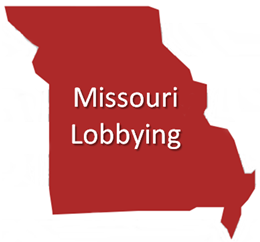 On November 28, a panel of the U.S. Court of Appeals for the Eighth Circuit panel affirmed a district court ruling that Missouri statutes regarding lobbyist registration and reporting were constitutional.
On November 28, a panel of the U.S. Court of Appeals for the Eighth Circuit panel affirmed a district court ruling that Missouri statutes regarding lobbyist registration and reporting were constitutional.
In Calzone v. Summers, The U.S. Court of Appeals for the Eighth Circuit upheld the United States District Court for the Western District of Missouri’s finding that the First Amendment does not shield unpaid individuals designated to act as a lobbyist from registration and reporting requirements under sections 105.470 and 105.473 of the Missouri Revised Statutes.
November 30, 2018 •
News You Can Use Digest – November 30, 2018
Federal: How FEC Babysitting Decision Could Pave Way for More Hill Diversity Roll Call – Stephanie Akin | Published: 11/26/2018 The FEC in May decided for the first time ever that child care was a legitimate campaign expense, on par […]

Federal:
How FEC Babysitting Decision Could Pave Way for More Hill Diversity
Roll Call – Stephanie Akin | Published: 11/26/2018
The FEC in May decided for the first time ever that child care was a legitimate campaign expense, on par with polling or campaign signs. In future years, the change is expected to increase the number of middle-class parents who take on the staggering time and financial commitments of a campaign. Because the FEC decision came just six months before Election Day, it is too early to tell if that will be the case. But the candidates who reported babysitting expenses this cycle provide the first indication of the difference it will make.
Manafort’s Lawyer Said to Brief Trump Attorneys on What He Told Mueller
MSN – Michael Schmidt, Sharon LaFraniere, and Maggie Haberman (New York Times) | Published: 11/27/2018
Former Trump campaign chairperson Paul Manafort’s attorney repeatedly spoke with the president’s lawyers about discussions with federal investigators after Manafort agreed to cooperate with special counsel Robert Mueller. Rudy Giuliani, who represents Trump in the special counsel’s investigation, said Manafort’s lawyer, Kevin Downing, relayed that investigators pressed Manafort on what Trump knew about the June 2016 Trump Tower meeting between campaign associates and a Russian lawyer who had promised dirt on Hillary Clinton. Trump’s legal team has maintained a joint defense agreement with witnesses in Mueller’s investigations, including Manafort. But it is uncommon for those agreements to continue after a witness reaches a plea agreement with prosecutors.
From the States and Municipalities:
Alaska: Judges Open Door Wider for Out-of-State Money in Alaska Elections
Anchorage Daily News – James Brooks | Published: 11/27/2018
A federal appeals court panel ruled Alaska’s limit on what nonresidents can contribute to candidates is unconstitutional. But the three-judge panel of the Ninth U.S. Circuit Court of Appeals upheld other donation limits it said were tailored to prevent corruption or the appearance of corruption. The judges upheld limits on contributions made by individuals to candidates and groups that are not political parties. They also upheld caps on the total amount a political party can give municipal candidates. The majority found the aggregate limit on what candidates can get from nonresidents violates the First Amendment. The opinion says states must show limits fight potential corruption and can’t simply go after “undue influence.”
District of Columbia: D.C. Council Approves Sweeping Reforms to Combat ‘Pay-to-Play’ Politics
Washington Post – Peter Jamison | Published: 11/20/2018
The District of Columbia Council gave preliminary approval to new campaign finance regulations, including restrictions on government contractors’ political contributions, bringing a potential sea change to a city that has witnessed repeated corruption scandals. The bill would ban campaign donations from firms and their top executives if they hold or are seeking government contracts worth at least $250,000. It would also give new authority and independence to the city’s Office of Campaign Finance, long viewed as a weak enforcer, and require increased disclosures from independent expenditure committees.
Maryland: Hogan Names Panel to Redraw Maryland’s 6th District, Despite Frosh Appeal of Court Order to Fix Gerrymandering
Baltimore Sun – Michael Dresser | Published: 11/26/2018
Gov. Larry Hogan created an “emergency” commission to redraw the borders of Maryland’s Sixth Congressional District, moving ahead on a new map despite state Attorney General Brian Frosh’s appeal of a federal ruling that ordered the redraft. Hogan signed an executive order creating a nine-person commission – made up of three Democrats, three Republicans, and three unaffiliated voters – to propose a new map. The governor’s decision puts the state on two paths in responding to the decision. As Maryland’s chief lawyer, Frosh is fighting to have the U.S. Supreme Court hear the case and rule before a new map is created. Meanwhile, Hogan, as chief executive, is pushing forward with an effort to comply with it.
Missouri: Court Ruling Could Force Everyday Missourians to Register as Lobbyists, Attorneys Say
Kansas City Star – Jason Hancock | Published: 11/29/2018
An appeals court panel ruled against a man challenging a Missouri law that places restrictions on unpaid political activists. Ron Calzone was testing the law that requires anyone attempting to influence lawmakers to follow the same rules as professional lobbyists. That means an individual would have to register as a lobbyist and file as many as 14 reports with the state each year. A panel of the Eighth U.S. Circuit Court of Appeals decided the First Amendment does not shield citizen activists from these requirements or the penalties for noncompliance. The U.S. Supreme Court has not reviewed a lobbyist registration case since 1954’s United States v. Harriss, in which the court limited the reach of a federal statute to only cover “those who for hire attempt to influence legislation or who collect or spend funds for that purpose.”
Missouri: Parson Alters Lobbyist Gift Ban Rules Imposed by Greitens
St. Louis Post-Dispatch – Kurt Erickson | Published: 11/20/2018
Missouri Gov. Mike Parson tweaked an order issued by his predecessor that could bring an end to a federal lawsuit over a ban on gifts from lobbyists. In a rewrite of an executive order issued by former Gov. Eric Greitens on the day he took office in 2017, Parson altered a section that prohibited executive branch employees from accepting gifts. The new wording, which adopts descriptions found in existing law, could allow groups like a Virginia-based law firm to distribute informational books to employees of the governor’s office.
New Jersey: ‘Dark Money’ Flows into NJ Politics and None of It Has to Be Accounted For
Bergen Record – Dustin Racioppi | Published: 11/26/2018
With the midterms over, New Jersey lawmakers will soon turn their attention to the 2019 legislative races. If recent history is an indicator, outside money will flood into the state as Democrats try to bolster their majority in the statehouse. And none of it has to be accounted for. This “dark money” is hidden from the public because New Jersey’s rules governing campaign finance have not been updated in years. That is despite a push from the Election Law Enforcement Commission to strengthen the state’s disclosure laws, a push that has been met with inaction by the Democratic-controlled Legislature. The result is a confusing patchwork of regulations that leave the state susceptible to massive amounts of “dark money.”
New York: Lawsuit Seeks to Block New York’s Sweeping New Lobbying Rules
Albany Times Union – Chris Bragg | Published: 11/28/2018
The New York Joint Commission on Public Ethics (JCOPE) this year passed regulations overhauling the rules that cover the state’s lobbying industry. A lawsuit argues JCOPE lacks the authority to create the 92 pages of new regulations. The plaintiffs say those rules would unduly burden lobbyists and their clients and infringe on their free speech rights. The petitioners want to see the regulations struck down in state Supreme Court and are seeking an injunction disallowing JCOPE from enforcing them in the interim. While JCOPE’s staff have said the new rules largely codify decades of existing state ethics opinions, the regulations were meant to update New York’s lobbying rules, as modern lobbying campaigns emphasize the application of public pressure on lawmakers separate from more traditional person-to-person lobbying.
New York: N.Y. Democrats Vowed to Get Big Money Out of Politics. Will Big Money Interfere?
MSN – Vivian Wang (New York Times) | Published: 11/22/2018
A loophole in New York’s campaign finance law has for more than 20 years allowed corporations to create limited liability companies (LLCs) for the sole purpose of giving virtually unlimited amounts of money to candidates. Democrats, in their successful bid to recapture the state Senate for the first time in a decade, campaigned on a promise to close it. But even as they vowed to muzzle big money’s influence, they benefited from the same LLC contributions they were railing against. The corporations’ sudden generosity, and Democrats’ acceptance of it, has raised questions about whether lawmakers will make good on their promise to overhaul New York’s campaign finance system, or whether – now that they have consolidated control of Albany’s levers of power – they might prefer to bask in its perks.
Ohio: City of Columbus Proposes Campaign Finance Reforms
WOSU – Adora Namigadde | Published: 11/28/2018
Mayor Andrew Ginther and other Columbus officials unveiled a proposed campaign finance law that would limit annual individual and group contributions to $12,707.79 and require anyone running election ads to immediately disclose who paid for them. But members of a progressive group that often opposes the city’s Democratic establishment said they believe that limit is too high compared to other cities and are developing their own proposal with a much lower cap. The legislation also would require auditing of campaign finance filings to assure compliance.
South Carolina: Court Case Could Change How SC Statehouse Elections Are Funded
Charleston Post and Courier – Jamie Lovegrove | Published: 11/26/2018
Even before he won a special election to the state Senate in November, Dick Harpootlian landed a potentially game-changing blow to the way statehouse campaigns are funded in South Carolina. Inundated with television ads funded by the Senate GOP caucus, a group that includes all Republican incumbents, Harpootlian filed a lawsuit claiming the ads amounted to an excessive campaign contribution on behalf of his opponent, Benjamin Dunn. If Harpootlian ends up winning the full case, legislators and operatives believe it could have a dramatic impact on the way campaigns are financed moving forward, curbing the influence in elections from powerful party groups.
Tennessee: Mayor Briley Halts Public Works Contracts, Hires Compliance Officer Amid Questions Raised in Audit
The Tennessean – Joey Garrison | Published: 11/27/2018
Nashville Mayor David Briley halted five future Metro Public Works contracts for sidewalk, paving, and other capital projects amid questions raised in a recent audit about the department’s close relationship with a top engineering contractor. The administration also announced plans to hire the city’s first-ever chief compliance officer who will work in the mayor’s office to review ethics in the city’s procurement process. The moves come after it was reported that photos showed executives from Collier Engineering, which has won $48.7 million in Metro contracts since 2010, entertaining city officials inside a company suite at Bridgestone Arena during multiple sporting events this year. In several cases, the city employees did not appear to pay for the tickets, violating the ethics code on accepting gifts.
November 29, 2018 •
Montana Proposes New Lobbyist Registration Threshold
The Montana Commissioner of Political Practices has proposed to amend the threshold amount a lobbyist can earn to trigger lobbyist registration with the state. The current amount of $2,550 was set in 2017. The new proposed threshold amount for 2019 […]
 The Montana Commissioner of Political Practices has proposed to amend the threshold amount a lobbyist can earn to trigger lobbyist registration with the state.
The Montana Commissioner of Political Practices has proposed to amend the threshold amount a lobbyist can earn to trigger lobbyist registration with the state.
The current amount of $2,550 was set in 2017. The new proposed threshold amount for 2019 is $2,600.
Anyone who is directly affected by the proposal can express their views at a public hearing by making a written request for a hearing no later than 5:00 pm on December 11, 2018.
Hearing requests should be made to Scott Cook at 406-444-2942 or via email at scook3@mt.gov.
November 29, 2018 •
Lawsuit Filed Over JCOPE’s Comprehensive Lobbying Regulations
A lawsuit has been filed against the Joint Commission on Public Ethics to stop the commission’s Comprehensive Lobbying Regulations from going into effect on January 1, 2019. David Grandeau, a former lobbying enforcement official and one of three petitioners in […]
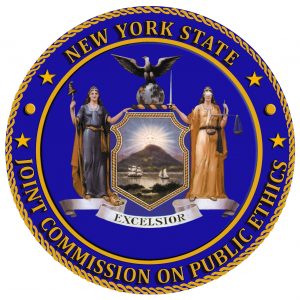 A lawsuit has been filed against the Joint Commission on Public Ethics to stop the commission’s Comprehensive Lobbying Regulations from going into effect on January 1, 2019.
A lawsuit has been filed against the Joint Commission on Public Ethics to stop the commission’s Comprehensive Lobbying Regulations from going into effect on January 1, 2019.
David Grandeau, a former lobbying enforcement official and one of three petitioners in the lawsuit, argue the commission lacks the authority to create regulations that expand and amend New York’s Lobbying Act.
The lawsuit, York Group Associates LLC v. Joint Commission on Public Ethics was filed in state Supreme Court in Albany on November 28, 2018.
November 29, 2018 •
Thursday’s LobbyComply News Roundup
Campaign Finance National: “Unnamed Donors Gave Large Sums to Conservative Nonprofit That Funded Pro-Trump Allies” by Michelle Ye Hee Lee (Washington Post) for MSN Alaska: “Judges Open Door Wider for Out-of-State Money in Alaska Elections” by James Brooks for Anchorage […]
 Campaign Finance
Campaign Finance
National: “Unnamed Donors Gave Large Sums to Conservative Nonprofit That Funded Pro-Trump Allies” by Michelle Ye Hee Lee (Washington Post) for MSN
Alaska: “Judges Open Door Wider for Out-of-State Money in Alaska Elections” by James Brooks for Anchorage Daily News
Elections
National: “Roger Stone Sought WikiLeaks’ Plans Amid 2016 Campaign, Associate Says” by Sharon LaFraniere and Maggie Haberman New York Times) for WRAL
Michigan: “Ethics Committee: Brenda Jones can keep Detroit job while in Congress” by Todd Spangler and Kat Stafford for Detroit Free Press
Mississippi: “Cindy Hyde-Smith Holds Off Mike Espy to Keep Mississippi Senate Seat” by Alan Blinder (New York Times) for WRAL
Ethics
National: “Manafort’s Lawyer Said to Brief Trump Attorneys on What He Told Mueller” by Michael Schmidt, Sharon LaFraniere, and Maggie Haberman (New York Times) for MSN
National: “Republicans Block Mueller Protection Bill from Senate Floor Vote” by Caitlin Oprysko and Marianne Levine for Politico
New Mexico: “SIC Approves $5.65 Million ‘Pay-to-Play’ Settlement” by Dan Boyd for Albuquerque Journal
Pennsylvania: “Ex-Allentown Finance Director Sentenced to House Arrest for Pay-to-Play Scheme” by Peter Hall and Emily Opilo for Allentown Morning Call
Tennessee: “Mayor Briley Halts Public Works Contracts, Hires Compliance Officer Amid Questions Raised in Audit” by Joey Garrison for The Tennessean
Lobbying
Missouri: “Federal Appeals Court Decides Against Mid-Missouri Man, Ruling Unpaid Activists Are Lobbyists” by the Staff for Lake Expo
New York: “Lawsuit Seeks to Block New York’s Sweeping New Lobbying Rules” by Chris Bragg for Albany Times Union
November 28, 2018 •
Alberta, Canada Considering Municipal Campaign Finance Bill
On November 26, a campaign finance bill concerning municipal elections in Alberta, Canada, was adjourned for consideration of an amendment increasing the proposed fines for third party election advertisers found in violations of the Act. The provincial government’s initial 180-page […]
 On November 26, a campaign finance bill concerning municipal elections in Alberta, Canada, was adjourned for consideration of an amendment increasing the proposed fines for third party election advertisers found in violations of the Act.
On November 26, a campaign finance bill concerning municipal elections in Alberta, Canada, was adjourned for consideration of an amendment increasing the proposed fines for third party election advertisers found in violations of the Act.
The provincial government’s initial 180-page legislation, Bill 23, An Act to Renew Local Democracy in Alberta, introduced earlier this month, would ban corporate and union political contributions for municipal and school board elections. Individuals would be limited to contributions of $4,000 for local elections.
Additionally, campaign periods would be shortened from four years to one year before the date of a local election. The bill also requires financial disclosures from all local candidates, including individuals who fund their own campaigns.
Some entities would still be able to receive unlimited contributions from individuals, unions, and corporations, but would have to disclose the names of its contributors to Elections Alberta. Those organizations would also be limited on how the raised funds could be spent.
November 28, 2018 •
Anti-Corruption and Public Integrity Act Introduced in House
On November 16, a 289-page bill with various changes to federal lobbying and ethics laws was introduced in the House of Representatives. The identical bill was introduced in August in the U.S. Senate by Sen. Elizabeth Warren. Among the legislative […]
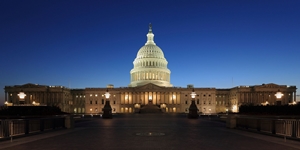 On November 16, a 289-page bill with various changes to federal lobbying and ethics laws was introduced in the House of Representatives. The identical bill was introduced in August in the U.S. Senate by Sen. Elizabeth Warren.
On November 16, a 289-page bill with various changes to federal lobbying and ethics laws was introduced in the House of Representatives. The identical bill was introduced in August in the U.S. Senate by Sen. Elizabeth Warren.
Among the legislative changes included in H.R. 7140, the “Anti-Corruption and Public Integrity Act”, are an expanded definition of “lobbyist”. The new definition covers individuals employed for compensation making at least one lobbying contact or engaging in lobbying activities that do not include making lobbying contacts.
The bill creates the definition of “corporate lobbyist”, which are lobbyists compensated by for-profit entities and 501(c)(6) organizations like chambers of commerce, but does not include other 501(c) entities or political organizations. Reporting by lobbyists would be expanded to include disclosure of specific bills, policies, and governmental actions attempted to be influenced, meetings with public officials and documents provided to those officials.
The bill permanently bans all foreign lobbying by both foreign actors and American lobbyists. American lobbyists would be prohibited from accepting money from foreign governments, foreign individuals, and foreign companies to influence United States public policy.
Other changes include a life-time ban on lobbying by former presidents, vice presidents, cabinet secretaries, members of Congress, and federal judges. All other federal employees would be banned from lobbying their former office, department, agency, or Congress after leaving their position until the end of the Administration, but for no less than two years or at least six years for corporate lobbyists. The bill prohibits companies from immediately hiring senior government officials from an agency or office recently lobbied by that company.
The law similarly would prohibit large companies, measured by annual revenue or market capitalization, from hiring former senior government officials for four years after they leave the government. Additionally, lobbyists would be prohibited from making political contributions to candidates or members of Congress, giving gifts to the executive and legislative branch officials being lobbied, and from working for any contingency fee. The bill also contains changes to the federal rule-making process, expands the open record laws, creates ethics requirements for the judicial branch, including the Supreme Court, and creates an independent U.S. Office of Public Integrity for enforcement.
An additional part of the bill addresses conflict of interest laws for federal office holders and employees, including a ban on stock ownership, while in office or employed, by members of Congress, federal judges, and White House staff and senior agency officials. Also, the legislation includes the “Presidential Conflicts of Interest Act”, which requires sitting presidents and vice presidents to place conflicted assets into blind trusts to be sold.
November 28, 2018 •
Wednesday’s LobbyComply News Roundup
Campaign Finance National: “Jeb Bush Super-PAC Fined $200,000 for Campaign Finance Violation” by Ken Doyle for Bloomberg Government New Jersey: “‘Dark Money’ Flows into NJ Politics and None of It Has to Be Accounted For” by Dustin Racioppi for Bergen […]
 Campaign Finance
Campaign Finance
National: “Jeb Bush Super-PAC Fined $200,000 for Campaign Finance Violation” by Ken Doyle for Bloomberg Government
New Jersey: “‘Dark Money’ Flows into NJ Politics and None of It Has to Be Accounted For” by Dustin Racioppi for Bergen Record
South Carolina: “Court Case Could Change How SC Statehouse Elections Are Funded” by Jamie Lovegrove for Charleston Post and Courier
Elections
National: “How to Influence Campaigns: Take inexperienced staffers, stir in a small amount of money, Democrats find” by Michael Scherer for Washington Post
Ethics
National: “Manafort Breached Plea Deal by Repeatedly Lying, Mueller Says” by Sharon LaFraniere (New York Times) for WRAL
National: “Trump Nominee Sunk by ‘Fat Leonard’ Corruption Scandal” by Craig Whitlock for Washington Post
New Jersey: “Bridgegate: Ex-Christie aides win appeal on one conviction, still guilty on two other counts” by Andrew Ford for Bergen Record
Lobbying
National: “Corporations Risking ‘Serious Corruption’ by Failing to Disclose Political Engagement, Researchers Say” by Chloe Taylor for CNBC
Redistricting
Maryland: “Hogan Names Panel to Redraw Maryland’s 6th District, Despite Frosh Appeal of Court Order to Fix Gerrymandering” by Michael Dresser for Baltimore Sun
November 27, 2018 •
Tuesday’s LobbyComply News Roundup
Campaign Finance National: “How FEC Babysitting Decision Could Pave Way for More Hill Diversity” by Stephanie Akin for Roll Call Canada: “Province Limits Political Donations at Municipal Level” by Paul Clarke for Rocky Mountain Outlook Massachusetts: “Agency Weighs Limit on […]
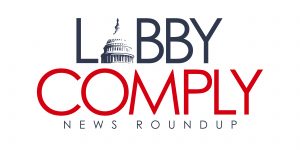 Campaign Finance
Campaign Finance
National: “How FEC Babysitting Decision Could Pave Way for More Hill Diversity” by Stephanie Akin for Roll Call
Canada: “Province Limits Political Donations at Municipal Level” by Paul Clarke for Rocky Mountain Outlook
Massachusetts: “Agency Weighs Limit on Union Giving” by Christian Wade for Gloucester Times
Nevada: “We May Never Know Exactly Why Nevada Politicians Put $2 Million on Campaign Credit Cards” by James DeHaven for Reno Gazette-Journal
Elections
New Mexico: “ABQ Councilors Approve Moving City Elections” by Steve Knight for Albuquerque Journal
Ethics
National: “It’s Not Just Trump in House Democrats’ Cross Hairs. His Family Is, Too.” by Maggie Haberman and Nicholas Fandos (New York Times) for MSN
National: “Conservative Author and Roger Stone Associate Jerome Corsi Says He Is Rejecting Plea Deal from Special Counsel” by Rosalind Helderman for Washington Post
California: “Palo Alto Tech Chief Whose Junkets Triggered Ethics Complaint Says He’s Quitting” by Thy Vo for Santa Cruz Sentinel
November 26, 2018 •
Monday’s LobbyComply News Roundup
Campaign Finance New York: N.Y. Democrats Vowed to Get Big Money Out of Politics. Will Big Money Interfere?by Vivian Wang (New York Times) for WRAL Washington D.C.: D.C. Council Approves Sweeping Reforms to Combat ‘Pay-to-Play’ Politics by Peter Jamison for […]
 Campaign Finance
Campaign Finance
New York: N.Y. Democrats Vowed to Get Big Money Out of Politics. Will Big Money Interfere?by Vivian Wang (New York Times) for WRAL
Washington D.C.: D.C. Council Approves Sweeping Reforms to Combat ‘Pay-to-Play’ Politics by Peter Jamison for The Washington Post
Ethics
National: Trump Wanted to Order Justice Dept. to Prosecute Comey and Clinton by Michael Schmidt and Maggie Haberman (New York Times) for MSN
National: Conservative Nonprofit with Obscure Roots, Undisclosed Funders Paid Whitaker $1.2 Million by Robert O’Harrow Jr., Shawn Boburg, and Aaron Davis (Washington Post) for The Seattle Times
Colorado: Hickenlooper Paid Own Way for Some Trips, Says He Followed Ethics Law on Others by David Migoya for The Denver Post
New York: New York State Judge Allows Suit Against Trump and His Personal Charity to Proceed by Jonathan O’Connell and David Fahrenthold (Washington Post) for The Chicago Tribune
Lobbying
Missouri: Parson Alters Lobbyist Gift Ban Rules Imposed by Greitens by Kurt Erickson for the St. Louis Post-Dispatch
November 21, 2018 •
Missouri Gov. revises ethics order, brings back lobbyist ban
Missouri Gov. Mike Parson signed an executive order superseding an ethics policy implemented by his predecessor, former Gov. Eric Greitens. Greitens’ first act as governor in 2017 was to issue Executive Order 17-02, banning executive branch employees from accepting lobbyist gifts […]
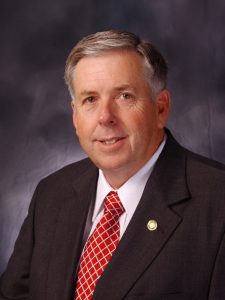 Missouri Gov. Mike Parson signed an executive order superseding an ethics policy implemented by his predecessor, former Gov. Eric Greitens.
Missouri Gov. Mike Parson signed an executive order superseding an ethics policy implemented by his predecessor, former Gov. Eric Greitens.
Greitens’ first act as governor in 2017 was to issue Executive Order 17-02, banning executive branch employees from accepting lobbyist gifts and prohibiting governor’s office personnel from lobbying the executive branch if they leave their jobs.
Parson’s Executive Order 18-10 now bans employees of the Office of the Governor from acting as an executive lobbyist until the end of the administration in which he or she served.
The order also alters what gifts executive branch employees are banned from accepting from lobbyists, opening the door for “educational” materials such as books and souvenirs valued at less than $10.
The executive order became effective as of November 20, 2018, when it was signed.
November 21, 2018 •
Wednesday’s LobbyComply News Roundup
Campaign Finance National: “Democrats Plan ‘Aggressive’ Oversight of Federal Election Commission” by Dave Levinthal and Ashley Balcerzak for Center for Public Integrity Louisiana: “Ethics Board: Campaign funds can’t cover candidates’ child care costs” by Elizabeth Crisp for New Orleans Advocate […]
 Campaign Finance
Campaign Finance
National: “Democrats Plan ‘Aggressive’ Oversight of Federal Election Commission” by Dave Levinthal and Ashley Balcerzak for Center for Public Integrity
Louisiana: “Ethics Board: Campaign funds can’t cover candidates’ child care costs” by Elizabeth Crisp for New Orleans Advocate
Washington: “PDC Making More Progress on Case Work This Fiscal Year” by Sarah Gentzler for Washington State Wire
Elections
Mississippi: “In Mississippi, Issues of Race Complicate a Senate Election” by Astead Herndon and Alexander Burns (New York Times) for WRAL
Ethics
National: “CNN Drops Suit Against White House After Acosta’s Press Pass Is Fully Restored” by Paul Farhi and Meagan Flynn for Washington Post
National: “Zinke’s #2 Has So Many Potential Conflicts of Interest He Has to Carry a List of Them All” by Juliet Eilperin (Washington Post) for Everett Herald
National: “Cookie Ethics: Congresswoman-elect asks if she’s still allowed to sell Girl Scout cookies” by Nicole Gaudiano and Eliza Collins for USA Today
National: “Ivanka Trump Used a Personal Email Account to Send Hundreds of Emails About Government Business Last Year” by Carol Leonnig and Josh Dawsey (Washington Post) for MSN
State and Federal Communications, Inc. provides research and consulting services for government relations professionals on lobbying laws, procurement lobbying laws, political contribution laws in the United States and Canada. Learn more by visiting stateandfed.com.

